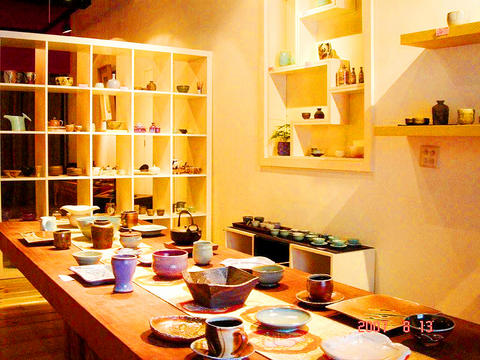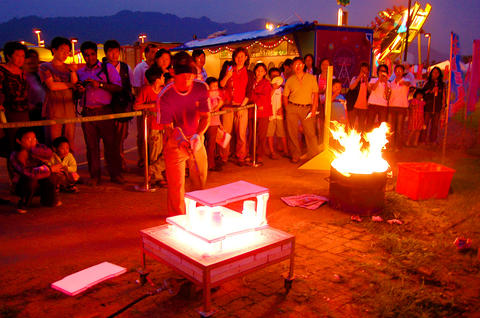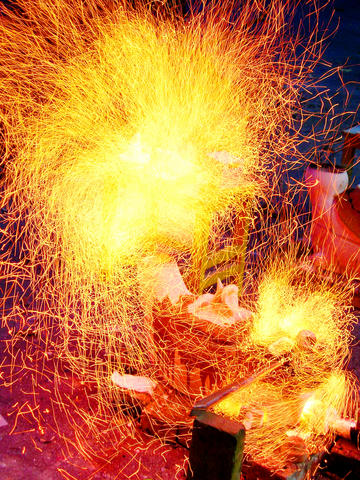The annual Yingge International Ceramics Festival (鶯歌國際陶瓷嘉年華) is a major part of the Yingge Ceramics Museum's (鶯歌陶瓷博物館) effort to win international recognition for producing high quality ceramics, particularly as a rival of China's Porcelain Capital, Jingde Zhen (景德鎮). The town prides itself on being an innovator in the field of ceramics, pushing the boundaries in concept and design, as well as production technology.
The festival, which starts today and runs until Oct. 14, has many objectives; not least of which is showing how much fun ceramics can be. This year's theme is the four elements - wind, earth, water and fire - which are vital to ceramic production, as well as symbols for environmental issues and Taoist alchemy and cosmology.
The Taoist element provides the basis for the highlight of the event: the welcoming of the God of the Kiln. This will happen through a parade along the streets of Yingge tomorrow (1:30pm to 3pm) and will be repeated again next Saturday (2:30pm to 3:30pm).

Photos: courtesy of the Yingge International Ceramics Festival
Activities take place around the museum, the ceramics park (陶瓷公園) and Shalun Plaza (砂輪廣場). There will be demonstrations of the potter's art throughout the festival, as well as opportunities for children to try their hand at pottery, mosaic-building and more.
Aside from the fun and games, the festival serves as an important forum for international ceramic artists. This year, French artist Jacque Kaufmann and American Doug Casebeer will be guests of the festival, and will work alongside local artists Chu Fang-yi (朱芳毅) and Hsu Chia-yu (許家瑜), both winners at the Fifth Taipei Ceramic Design Awards (第五屆台北陶藝創作獎). There will be a chance to watch these masters at work during the festival.
Two special exhibitions will be held in conjunction with the festival. The first, When Water Meets Ceramics (人間清歡:當水遇見陶特展), is an exploration of the close relationship of water to ceramics. No exhibition relating to water and pottery would be complete without some consideration of the role of tea preparation and consumption through the ages, and the museum will host five one-hour sessions with tea master Tsai Chung-nan (蔡忠南) on this subject.

A Selected Exhibition of New Ceramics Works (陶瓷新品評鑑展), an exhibition of work by 52 artists representing 34 manufacturers, is another opportunity to the view work of emerging artists.
The whole town of Yingge will be turning out for the festival, making this the perfect time to visit, even for those without a specific interest in ceramics. Workshops around town will be displaying their newest and best in anticipation of the inflow of tourists. There will be plenty happening to keep the kids interested, and if you want to get your hands dirty, there will be DIY activities to give you the full experience of being in Taiwan's very own porcelain capital.


April 28 to May 4 During the Japanese colonial era, a city’s “first” high school typically served Japanese students, while Taiwanese attended the “second” high school. Only in Taichung was this reversed. That’s because when Taichung First High School opened its doors on May 1, 1915 to serve Taiwanese students who were previously barred from secondary education, it was the only high school in town. Former principal Hideo Azukisawa threatened to quit when the government in 1922 attempted to transfer the “first” designation to a new local high school for Japanese students, leading to this unusual situation. Prior to the Taichung First

The Ministry of Education last month proposed a nationwide ban on mobile devices in schools, aiming to curb concerns over student phone addiction. Under the revised regulation, which will take effect in August, teachers and schools will be required to collect mobile devices — including phones, laptops and wearables devices — for safekeeping during school hours, unless they are being used for educational purposes. For Chang Fong-ching (張鳳琴), the ban will have a positive impact. “It’s a good move,” says the professor in the department of

On April 17, Chinese Nationalist Party (KMT) Chairman Eric Chu (朱立倫) launched a bold campaign to revive and revitalize the KMT base by calling for an impromptu rally at the Taipei prosecutor’s offices to protest recent arrests of KMT recall campaigners over allegations of forgery and fraud involving signatures of dead voters. The protest had no time to apply for permits and was illegal, but that played into the sense of opposition grievance at alleged weaponization of the judiciary by the Democratic Progressive Party (DPP) to “annihilate” the opposition parties. Blamed for faltering recall campaigns and faced with a KMT chair

Article 2 of the Additional Articles of the Constitution of the Republic of China (中華民國憲法增修條文) stipulates that upon a vote of no confidence in the premier, the president can dissolve the legislature within 10 days. If the legislature is dissolved, a new legislative election must be held within 60 days, and the legislators’ terms will then be reckoned from that election. Two weeks ago Taipei Mayor Chiang Wan-an (蔣萬安) of the Chinese Nationalist Party (KMT) proposed that the legislature hold a vote of no confidence in the premier and dare the president to dissolve the legislature. The legislature is currently controlled